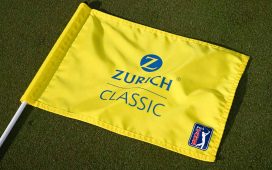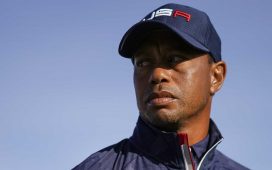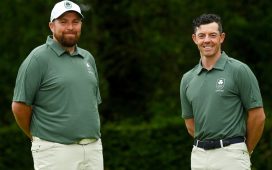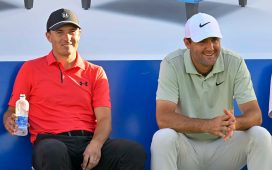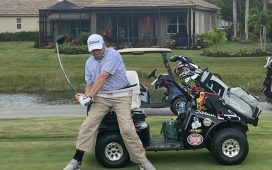In the summer of 2017, the boys’ idyllic country life was shattered on a family trip to the Midwest. They were being driven by their grandparents, Del and Patricia Boldt, when an awful car accident ensued. Del and Patricia were killed. The boys were airlifted to Children’s Mercy Hospital in Kansas City. Both had broken backs and a variety of other serious injuries. Luke was in a coma for eight days. “We nearly lost him a couple times,” says their father Terry, his voice thick with emotion. Golf became central to their comeback. The nurses papered their hospital rooms with pictures of their favorite golfers, Jordan Spieth and Dustin Johnson. The Open Championship telecast broke the gloomy silences. When Luke and Jackson were finally able to leave their rooms, their favorite spot to gather on the grounds became at the foot of the statue dedicated to the patron saint of Children’s Mercy, Tom Watson.
“Golf gave us something to focus on, something to look forward to,” says Jack, who was chipping and putting while still on crutches. After having metal rods inserted into his back and screws in his ankle, he didn’t miss a match for his high school team, where the brothers have helped build a mini-dynasty. Luke’s recovery has been more arduous. He’s had 29 surgeries to date, of which he says ruefully,”That’s gotta be some kind of record.” A nasty infection forced doctors to remove portions of his abdominal muscles. “I can’t do a sit-up to save my life,” he says. Core strength is important to the golf swing but Luke is proof that it ain’t everything. “There’s a lot of ways to do it,” he says, and he smashes the ball off the tee, just like his brother.
Until this week Shani had never met the Boldt — both of whom just finished their Eagle Scout training — but she knows the type. “You meet so many good people in the golf world,” she says. Her journey through the game is a story of inclusion, from all the guidance she received at the First Tee to the scholarship given to her by Urban Golf Performance, a high-tech swing and mental coaching center on the edge of Japantown in L.A. Golf has taken this city girl as far away as Rhode Island but she couldn’t hide her delight at being at Pebble Beach for the first time. On Tuesday she played a practice round at Poppy Hills with Olin Browne, who offered the following scouting report: “She has a beautiful swing, hits it hard and straight and is grinning from ear to ear. What’s not to like?” He enjoyed Shani’s company so much he invited her for another practice round the next day at Pebble Beach. If Shani seemed utterly at ease alongside the U.S. Senior Open champ it’s because is used to the mentor-mentee dynamic, albeit with the roles reversed. She dotes on her 12-year-old sister, Serena, and remains active with the First Tee. “I know those little girls are looking up to me and they see how far golf has taken me so I love to encourage them and set a good example,” she says.
The Boldt brothers also believe in giving back. Having to learn to walk again gave them a newfound empathy for kids with special needs, so at the First Tee of Coastal Carolinas they have founded “Buddy Tee,” a program that teaches adaptive golf to kids with physical and developmental challenges. Both Luke and Jack light up talking about some of the youngsters they’ve helped.
This sense of community service imbues the Pure, to which the brothers high school seniors — have brought a divergent energy. Jack sees the tournament as a victory lap to his golf comeback; his dream is to make the rodeo team at North Carolina State. “I’m just smelling the roses,” he says. Luke’s goal is to play at the next level so he was grinding hard at Pebble Beach, treating it as a potential showcase for college recruiters. It remains to be seen how far golf will take him, but Luke already has a backup plan: to be a trauma surgeon. Last year he returned to Children’s Mercy to shadow the doctors who operated on him. Both boys addressed the medical personnel who pieced them back together as part of a case study on long-term rehabilitation.
“There weren’t too many dry eyes when the boys were done speaking,” says Terry.
Luke laughs about their status at the hospital. “We’re case studies!” he says. Aren’t we all, in some way or another? All three of these remarkable teens offer hope that happy endings still exist.
To receive GOLF’s all-new newsletters, subscribe for free here.

